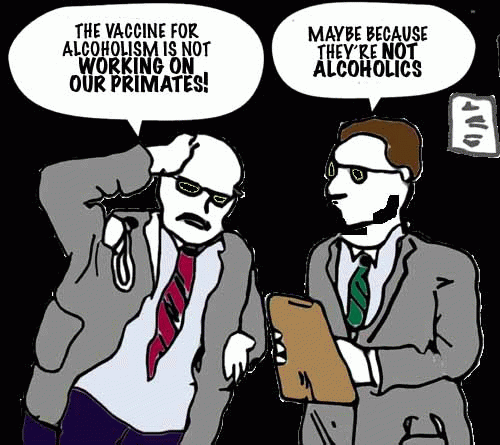Imagine a treatment for drug addiction and alcoholism that uses no drugs, requires no trained personnel, resources or insurance and makes no money for anyone. This "people's program" is the anonymous 12-Step groups which have quietly saved millions for 79 years.
But lately, Big Pharma sees potential in all that free healing. Increasingly, it is "partnering" with rehab facilities to monetize addiction recovery, especially by facilitating dual diagnoses that require expensive pills. A patient is no longer just an alcoholic, he is an alcoholic with bipolar disease or major depressive disorder. Ka-ching.
It's easy to see why Pharma wants a new revenue stream. Its blockbusters like Lipitor, Seroquel, Zyprexa, Singulair and Concerta have gone off patent and Medicare and Medicaid are starting to balk at paying for brand drugs that are no better than generics. (Some states are even suing for reimbursement for what they spent on brand drugs.) Huge fraud settlements in recent years against Abbott, Pfizer, GSK, Johnson & Johnson, Eli Lilly, AstraZeneca and Merck have also taken their toll.
Less easy to see is why the National Institute on Drug Abuse (NIDA), often working closely with Pharma, is trying to fix one of the few things in the health care system that is not broken--free, anonymous treatment for alcoholics and addicts. "All addictions can be eliminated if the brain's receptors can be controlled ," said an ominous NIDA flier last year announcing a speech by its director. Italics mine. Yes, "all."
Behind the search for bio solutions like a vaccine to treat addictions is Nora Volkow, NIDA director, called " an early champion of the idea that drug addiction is a medical problem, rather than a lack of willpower or moral fiber" which actually was the founding precept of Alcoholics Anonymous in 1935. But unlike AA founders who discovered that free, anonymous moral support--without drugs and outside of traditional medicine--worked in almost all cases, Volkow seeks high-tech interventions. "We have identified many of the biological and environmental factors [of addiction] and are beginning to search for the genetic variations that contribute to the development and progression of the disease," she says with Orwellian fervor.
Why is seeking genetic causes and bio treatments Orwellian? First, because addiction and alcoholism are diseases of denial and few would take a vaccine voluntarily (which is why Antabuse failed). You would think NIDA as the government's top drug agency would know that. Secondly, because Pharma, with whom Volkow has published many papers, rolls out many drugs for people "at risk" of heart disease, diabetes, bone thinning, and, of course psychiatric diseases, for revenue rather than medical reasons and this seems to be one of them. What if you feel no symptoms but your genes suggest you are "at risk"? What if you take an "early treatment" medication and never even needed it?
Finally, the quest for a biotech answer to alcoholism and drug addiction is chilling because the government and Pharma subject animals to painful, unnecessary experiments for "addictions." Making animals "addicts" to treat the uniquely human phenomenon is a fool's errand and a cruel one at that. One paper co-written by Volkow shows a bloody "pregnant bonnet macaque in transverse position within HR+ PET scanner... positioned so that maternal and fetal organs were within same field of view." The paper concludes that when primates are dosed with cocaine, fetuses are affected too. Thanks for that.
(Note: You can view every article as one long page if you sign up as an Advocate Member, or higher).






